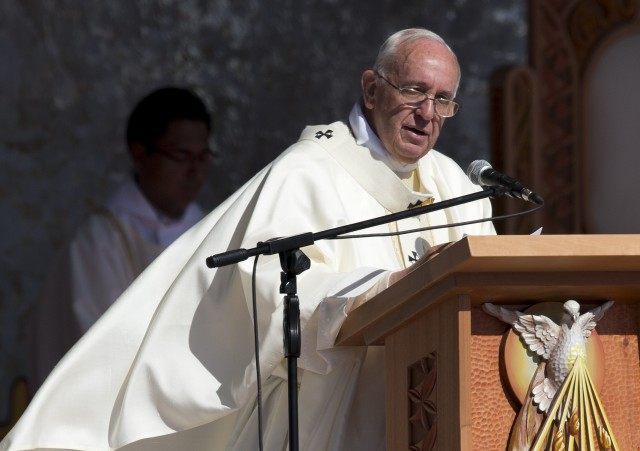Pope Francis used a Portuguese radio interview to weigh in on the European migrant crisis, citing Europe’s post-modern childless culture as one of the causes of the huge migration wave into Europe, and cautiously warning against the growing danger posed by migrating Islamic jihadis.
“If a country has no children, migrants come to occupy the place,” Francis said.
“I think the birth rates in Italy, Portugal and Spain are almost 0 percent… there are no children, there are empty spaces,” he said.
The birthrate has crashed in part because Europeans are focused on their personal well-being, he said. “I heard it in my own family, from my Italian cousins here, years ago: ‘No, no kids, we prefer to go on vacation or buy a villa, or this or that.’ And then, the elderly are left all alone,” he said.
“Europe has not yet died,” he said. “It is half grandmother, but can return to being a mother.”
Francis also suggested that Europe’s leaders should help unemployed Europeans prior to calling in more migrants.
In three important European countries, he said, “for 25-year-olds and under, unemployment is 40% in one country, 47% in another and 50% in the third.”
But he still wants Europe to welcome migrants — “if adequate security is in place.”
Obviously,” Francis said, “if a refugee comes with all the appropriate security measures in place we must receive him, because it is a commandment in the Bible. Moses tells his people: ‘Receive the stranger because remember that you were once strangers in Egypt,’ right?”
Security against Islamic terrorism is a growing problem, Francis said, without mentioning Islam by name.
“I have to acknowledge that territorial security conditions are not the same today as they were in other times,” he said. “Just 400 km to the south of Sicily we have an extraordinarily brutal terrorist group [in Libya], and then we have the danger of infiltration, right?”
Libya’s various jihadi groups, especially the Islamic State franchise, has credited Islamic doctrine for its garish, videotaped murders of many Arab Christians.
Rome is not “immune” to this danger either,” Francis said. “You can take precautions and people are still coming,” he said.
When asked about his directive to Catholic parishes to shelter migrant families, Francis said he had purposefully asked them to host families, not individuals.
“What I asked was this,” he said, “for every parish, every religious institute and every convent to host a family. A family, not an individual. A family gives more security of containment, and helps avoid infiltrations of other sorts.”
Alongside his support for migrants and his worries about jihadis, Francis also addressed what he called the deeper causes of the current crisis, repeating his pleas for greater economic fairness and a Christian revival.
“The dominant economic system today,” he said, “has removed the person from the center, replacing him with the god of money, and the idol of fashion.”
When asked how in practice to address the root causes of migration from the Middle East and Africa to Europe, Francis said: “Where the cause is hunger, create jobs, invest. Where the cause is war, seek peace, work for peace.”
Still, Christians should try to aid migrants, he said.
“I know what migration is,” he said. “I am the son of migrants from the wave of the 1929, but in Argentina, Italians, Spaniards and Portuguese began arriving as far back as 1884.”
When the great depression hit Argentina in the 1930s, some of his extended family had to stay in the street with nothing, until his grandfather bought a warehouse with two thousand pesos that he was able to borrow.
Francis also congratulated those who had taken up the challenge and are actively working to assist refugees, telling them it will go well for them on the Day of Judgment.
In chapter 25 of Saint Matthew’s gospel, Jesus tells them: ‘I was hungry, did you give me food?’ And they will say ‘yes.’ ‘And when I was without shelter, as a refugee, did you help me?’ ‘Yes.’ Congratulations, they will pass the test.”
Follow Thomas D. Williams on Twitter @tdwilliamsrome

COMMENTS
Please let us know if you're having issues with commenting.